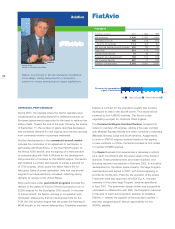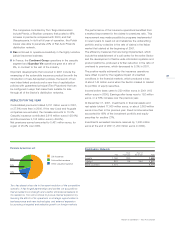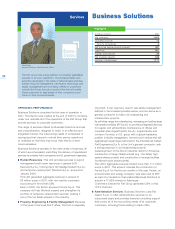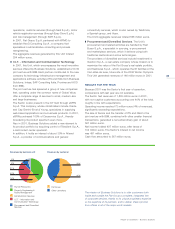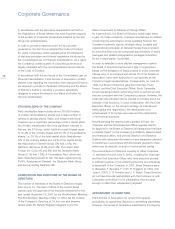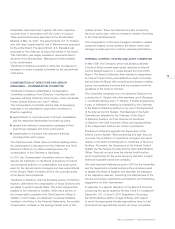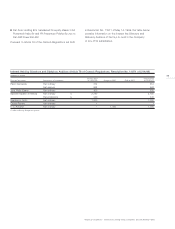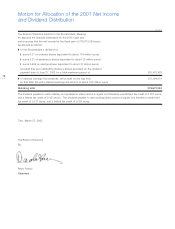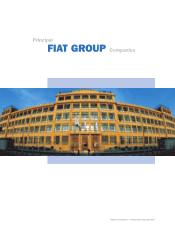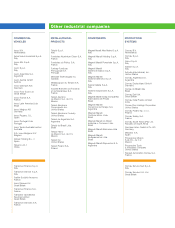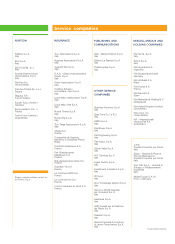Chrysler 2001 Annual Report Download - page 72
Download and view the complete annual report
Please find page 72 of the 2001 Chrysler annual report below. You can navigate through the pages in the report by either clicking on the pages listed below, or by using the keyword search tool below to find specific information within the annual report.
In accordance with the disclosure requirements set forth in
the Regulations of Borsa Italiana, the most important aspects
of the system of Corporate Governance adopted by the Fiat
Group are reviewed below.
In order to provide a reference point for its corporate
governance, the Fiat Group adopted the Code of Conduct
for Listed Companies, which supplemented the framework
of statutory provisions and internal regulations introduced by
the Consolidated Law on Financial Intermediation. As a result,
the Company’s overall system of corporate governance is
largely consistent with the recommendations and provisions
of the Code of Conduct.
In accordance with the provisions of the Consolidated Law on
Financial Intermediation, Fiat’s Articles of Association contain
precise rules regarding the information that executive Directors
are required to provide to the Board of Directors and the Board
of Statutory Auditors, including a provision specifically
designed to ensure the election of a Statutory Auditor by
minority stockholders.
STOCKHOLDERS OF THE COMPANY
Fiat’s stockholder base includes about 300,000 holders
of ordinary and preference shares and a large number of
owners of savings shares. Italian and foreign institutional
investors own a significant percentage of Fiat’s capital stock.
As of today, shareholders who hold significant interests in
Fiat are: the IFI Group, which holds an overall interest equal
to 30.4% of the ordinary shares and 30.1% of the preference
shares, i.e. 30.3% of the total capital stock; Mediobanca
(3% of the ordinary shares and 2.4% of the capital stock);
the Assicurazioni Generali Group (3% and 2.6%), the
SanPaolo IMI Group (2.9% and 2.4%), the Libyan Arab
Foreign Inv. Co (2.3% and 2%) and the Deutsche Bank
Group (2.1% and 1.8%). A Consultation Pact, which has
been disclosed pursuant to law, has been signed among
IFI/IFIL, Assicurazioni Generali, the Deutsche Bank Group
and Nuova Holding SanPaolo IMI.
COMPOSITION AND FUNCTIONS OF THE BOARD OF
DIRECTORS
The number of members of the Board of Directors ranges
from nine to 15. The term of office of the current Board
expires upon the approval of the financial statements for the
year ended December 31, 2001 by the Stockholders’ Meeting.
The Stockholders’ Meeting of May 14, 2001 set the number
of the Company’s Directors at 14, but one seat became
vacant when Mr. Renato Ruggiero resigned to join the
Italian Government as Minister of Foreign Affairs.
As a general rule, the Board of Directors meets eight times
a year. On those occasions, it reviews and decides on matters
concerning the performance of the operating Sectors; the
Company’s quarterly reports, strategic plans, budgets and
organizational proposals; all material transactions proposed
by executive Directors; and proposed appointments of senior
managers and related compensation packages submitted
by the Compensation Committee.
In order to establish a more efficient management system,
the Board of Directors has favored a type of organization
based on the delegation of equal powers to those corporate
officers who, in accordance with Article 18 of the Articles of
Association, have been authorized to act severally as the
Company’s legal representatives. Consequently, on June 23,
1999, the Board of Directors gave the Chairman, Paolo
Fresco, and the Chief Executive Officer, Paolo Cantarella,
broad operating powers, authorizing them to perform all acts
that are consistent with the Company’s purpose. However, the
Chairman has indicated that he intends to primarily focus the
exercise of his functions, in close collaboration with the Chief
Executive Officer, on the Group’s strategy, its international
relationships and negotiations, the development and
enhancement of its human resources and the optimization
of its financial resources.
Notwithstanding the ample powers granted to them, the
Chairman and the Chief Executive Officer regularly submit
for approval to the Board of Directors all transactions that have
a material impact on the Company’s profitability, balance sheet
and financial position, and provide Directors and Statutory
Auditors with adequate information on any transaction planned
or performed in accordance with the powers granted to them,
which may be atypical, unusual or involve related parties.
The current Board of Directors currently in office comprises
13 members (14 until June 6, 2001), including the Chairman
and the Chief Executive Officer who have executive powers.
A sufficient number of the remaining Directors are completely
independent of the Company. In 2001, these Directors were:
A. Benessia, F. Bernabè, F. Cotti, R. Ruggiero (in office until
June 6, 2001), F. G. Rohatyn and J. F. Welch. These Directors
do not have financial relationships with the Company, or with
companies controlling it or its subsidiaries, that are large
enough to affect their independent judgment.
APPOINTMENT OF DIRECTORS
Fiat’s Articles of Association do not set forth special
procedures for appointing Directors or submitting candidates.
However, the names of candidates submitted by the majority
72
Corporate Governance


